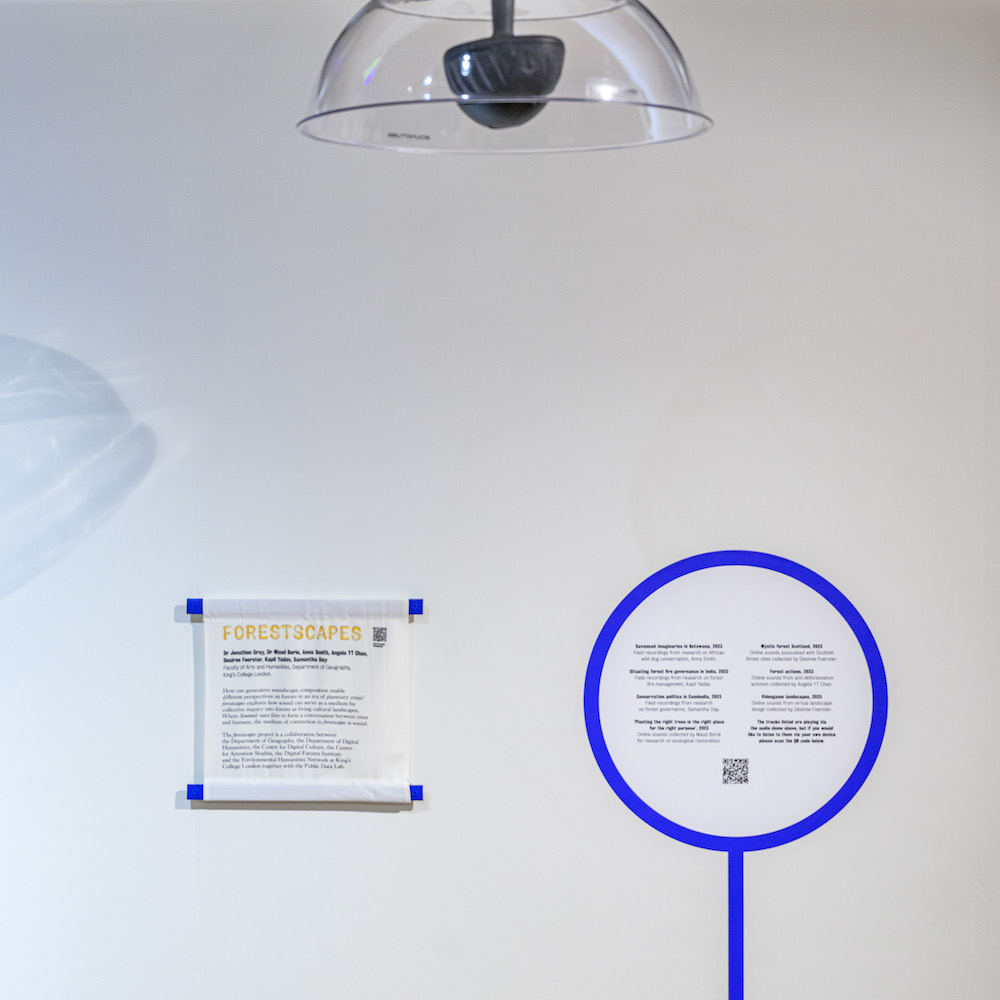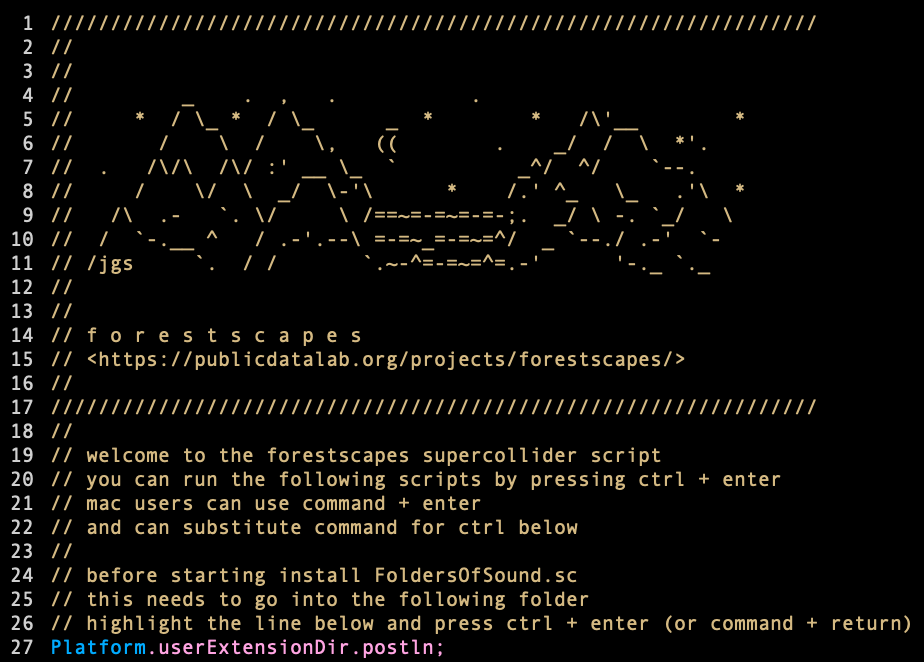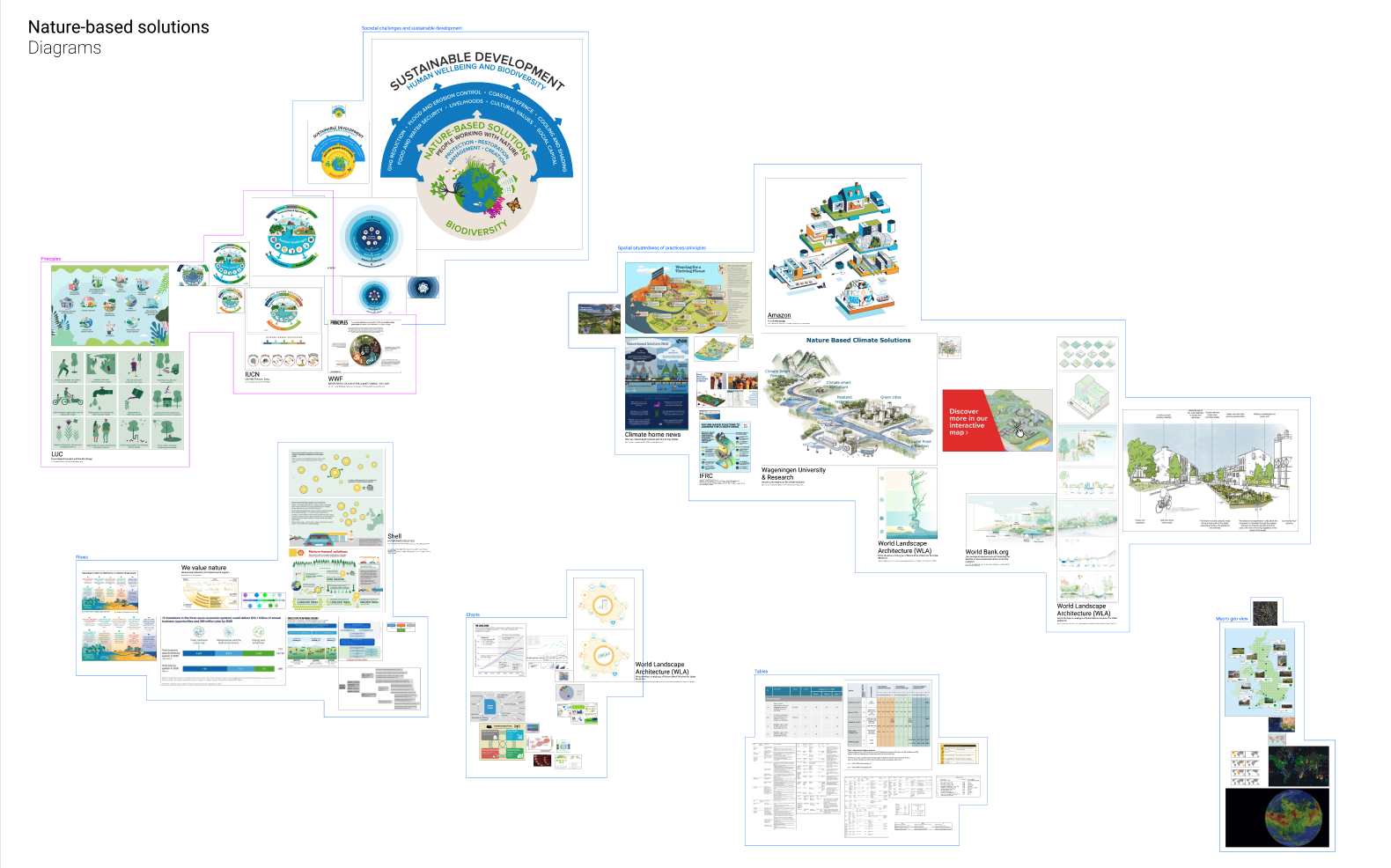Affiliation: King's College London
Kate Schreckenberg
Samantha Day
forestscapes

How can soundscapes be used as a way to attend to forest life and the many different ways of narrating and relating to forests, forest issues and forest protection and restoration efforts?
The forestscapes project aims to explore and document generative arts-based methods for recomposing collections of sound materials to support “collective inquiry” into forests as living cultural landscapes.
To receive occasional email updates about the project you can sign up here.
If you’re interested in collaborating or hosting a forestscapes workshop you can contact: forestscapes@publicdatalab.publicdatalab.org
For more see:
- Introducing forestscapes and open call for forest sounds
- Listening to forests: new project explores soundscapes as method for ecological research
- forestscapes software scripts for open source supercollider
- forestscapes software scripts for open source monome norns
- forestscapes listening lab at re:publica 23, Berlin (June 2023)
- forestscapes at Seeking Connection exhibition in London (November 2023 – January 2024)
- forestscapes at EASST-4S 2024 (July 2024)
- forestscapes spotlight as part of critical forest studies collaboratory digital planting (November 2024)



The forestscapes project is pollinated by the Department of Geography, the Department of Digital Humanities, the Centre for Digital Culture, the Centre for Attention Studies, the Digital Futures Institute and the Environmental Humanities Network at King’s College London with support from the UK’s National Environmental Research Council.
Pluralising Critical Technical Practices

A gathering and reconsideration of critical technical practices in digital research and beyond.
Contributions published in a special issue in Convergence: The International Journal of Research into New Media Technologies.
If you’re interested in critical technical practices and you’d like to follow work in this area, we’ve set up a mailing list here for sharing projects, publications, events and other activities: https://jiscmail.ac.uk/CRITICAL-TECHNICAL-PRACTICES
Further details (links will be added here as they are available):
- Pluralising critical technical practice – special issue introduction by Daniela van Geenen, Karin van Es and Jonathan W. Y. Gray
- Full special issue: Critical Technical Practice(s) in Digital Research
- Critical technical practices Zotero group
- Original call for proposals (2020)
Special issue articles:
- Hind, S., & Seitz, T. (2022). Cynical technical practice: From AI to APIs. Convergence. https://doi.org/10.1177/13548565221133248
- Dieter, M. (2022). Interface critique at large. Convergence. https://doi.org/10.1177/13548565221135833
- John-Mathews, J.-M., De Mourat, R., Ricci, D., & Crépel, M. (2023). Re-enacting machine learning practices to enquire into the moral issues they pose. Convergence. https://doi.org/10.1177/13548565231174584
- Koed Madsen, A. (2023). Digital methods as ‘experimental a priori’ – how to navigate vague empirical situations as an operationalist pragmatist. Convergence. https://doi.org/10.1177/13548565221144260
- Soon, W., & Velasco, P. R. (2023). (De)constructing machines as critical technical practice. Convergence. https://doi.org/10.1177/13548565221148098
- Jacomy, M., & Munk, A. K. (2022). Interfering with the black-box-tradeoff model: Gephisto, a one-click Gephi for critical technical practice. Convergence. https://doi.org/10.1177/13548565221129053
- Pawlicka-Deger, U. (2022). Feasibility documents as critical structuring objects: An approach to the study of documents in digital research production. Convergence. https://doi.org/10.1177/13548565221111073
- Ogden, J., Summers, E., & Walker, S. (2023). Know(ing) Infrastructure: The Wayback Machine as object and instrument of digital research. Convergence. https://doi.org/10.1177/13548565231164759
- Hirsbrunner, S. D., Tebbe, M., & Müller-Birn, C. (2022). From critical technical practice to reflexive data science. Convergence.https://doi.org/10.1177/13548565221132243
- Rieder, B., Peeters, S., & Borra, E. (2022). From tool to tool-making: Reflections on authorship in social media research software. Convergence. https://doi.org/10.1177/13548565221127094
- Chao, J., van Geenen, D., Gerlitz, C., & van der Vlist, F. N. (2024). Digital methods for sensory media research: Toolmaking as a critical technical practice. Convergence. https://doi.org/10.1177/13548565241226791
- Chávez Heras, D. (2023). Creanalytics: Automating the supercut as a form of critical technical practice. Convergence. https://doi.org/10.1177/13548565231174592
- Querubín, N. S., & Niederer, S. (2022). Climate futures: Machine learning from cli-fi. Convergence. https://doi.org/10.1177/13548565221135715
Image credit: “All Gone Tarot Deck” co-created by Carlo De Gaetano, Natalia Sánchez Querubín, Sabine Niederer and the Visual Methodologies Collective from Climate futures: Machine learning from cli-fi, one of the special issue articles.
Forest Media Practices

A collaboration with the European Forest Institute exploring how arts- and humanities-based digital methods can be used to understand forest issues and to explore engagement around reforestation. Undertaken as part of the SUPERB project on upscaling forest restoration.
This is an ongoing research project and materials will be listed here when they are available.
- COP27 on Twitter: Forest restoration issues and narratives through hashtags (also cross-posted at EFI blog and Public Data Lab blog)
- What Twitter images tell us about COP27 issues: A focus on the Forests and Climate Leaders’ Partnership and Biodiversity Day (also cross-posted at EFI blog and resilience blog)
- Exploration of forest restoration stories on YouTube
- What can Google Image search results tell us about human-forest relationships?
- Colombo, G., & Gray, J. W. Y. (2023). Un-indexing forest media: Repurposing search query results to reconsider forest-society relations. Cultural Geographies.
- Plus four accompanying speculative catalogues on place names, invitations, infrastructures and stories.
- networked nature-cultures spotlight as part of critical forest studies collaboratory digital planting (November 2024)
Photini Vrikki
Jose Miguel Monteiro Vieira
Mapping the Politics of Nature-Based Solutions

Over the past decade “nature-based solutions” have risen to prominence as part of international commitments to addressing different kinds of societal issues and public problems including climate change, biodiversity loss, well being, disaster reduction and economic development.
In this collaborative digital methods project we gather and repurpose online materials associated with “nature-based solutions” on a variety of platforms and online spaces in order to understand more about the origins, development and politics of this term.
The project included a series of workshops with campaigners and investigators from Global Witness, researchers from the departments of Geography and Digital Humanities at King’s College London and DensityDesign Lab at the Politecnico di Milano. It received support from the Natural Environment Research Council (NERC).
For more about the project see:
- “Nature-based solutions”: using digital methods to investigate corporate greenwashing, Global Witness, 12th July 2022
- Fossil fuel greenwash, Global Witness, 15th February 2023
- Querying nature-based solutions – “These cards are an invitation to query and re-index Google search results for ‘nature-based solutions’, looking beyond more prominent promotional narratives to surface concerns, questions, tensions and uncertainties with advocating nature as solution. Each card contains a critical quote together with its original search position and source.”